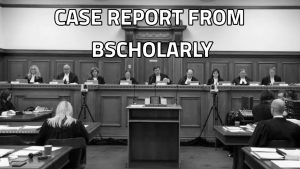Hedley Byrne v Heller [1964] AC 465: In the law of torts, the tort of negligence comes about where there is a duty of care on the part of a person and such duty of care is breached, while the party who is owed the duty of care suffers a loss.
It has been found that negligence occurs also with regards to statements made by persons, which statements are relied on by other persons and which results in a loss, economic loss or otherwise.

In the case of Hedley Byrne & Co. Ltd. V. Heller & Partners Ltd, the court determined whether damages will incur where there has been a negligent misstatement.
This case was a turning point in the law of torts because, before this case, the idea of owing a duty of care to person, for statements made and incurring liability as a result of a breach of this duty of care, was one that was rejected by the courts. This can be seen in the case of Candler v. Crane, Christmas & Co. In that case, Donald Oglivie, the owner of a Tin mine called Trevaunance Hydraulic Tin Mines Ltd, after making an advertisement with regards to wanting more capital and Directorship, employed the services of a firm of auditors, Crane, Christmas & Co., the defendants, to prepare his company’s account.
This is in response to the interest shown by the plaintiff, Candler, who intended to buy shares worth of £2000. The defendants prepared the account which was shown to Candler in the presence of the defendants and relying on the account, the plaintiff subscribed to the shares of the company by buying shares worth of £2000. It was later found that the company was in a bad state financially and the plaintiff’s money was squandered by Donald Oglivie.
The plaintiff sued the defendant for negligent misstatement. The majority members of the Court of Appeal, relying on the decision made in Derry v Peek, held that the plaintiff could not get damages as there was neither a contract between them or a fiduciary relationship.
Also see: Types of mistakes in contract law
Denning LJ as he then was, however, gave a dissenting opinion, stating that the accountants owed a duty to the plaintiff because the relationship between the plaintiff and the defendant was direct, regardless of the fact that there was no contract between them. To him, the accountants were professionals and owed a duty to the plaintiff.
Even though the duty of care was not found in the above case, it is obvious that the court started to lean towards finding a duty of care for any professional where a statement has been made and relied on. This was seen in the case of Hedley Byrne & Co Ltd. v Heller & Partners Ltd.
Recommended: Facts, Issues and Judgment of Court In Fisher v Bell
Facts of Hedley Byrne v Heller
Hedley Byrne were advertising agents. They advertised contracts on behalf of their client Easipower Ltd. on credit and they were to be liable personally for the default of their client.

In order to have some sort of protection and be certain of their client’s financial creditworthiness, the plaintiff asked their bank to get a credit reference from their client’s bank, Heller & Partners. However, Heller & Partners made a disclaimer by including an exclusion clause in the credit reference which stated that the information given in the credit reference was given without responsibility to the bank and the bank’s officials. But still, it went ahead to state that Easipower Ltd. was good to engage in ordinary business.
This reference was still, however, relied on by the plaintiff who later suffered loss financially to the tune of £17000, on the liquidation of the clients.
Also see: Facts Summary and Analysis of Donoghue v Stevenson
Issues Determined in Hedley Byrne v Heller
Whether or not the defendants, Heller and Partners were liable in negligent misstatement for the reference made by them on behalf of the plaintiff Hedley Byrne.
Whether an action for damages can arise as a result of negligent misstatement where there has been an economic loss.
Also see: How to become a successful lawyer: 10 Qualities you need
Decision of the court in Hedley Byrne v Heller
In the lower court, it was found in favour of the defendants, where it was held that their disclaimer was sufficient to absolve them from any responsibility. The plaintiffs appealed to the House of Lords.

The House of Lords noted the following: that there was a fiduciary relationship existing between the parties; that the defendant had taken on the risk voluntarily; that the plaintiff relied on the information and advice of the defendant; and that the reliance of the plaintiff on the advice of the defendant was reasonable.
It decided that where the above conditions are met, then damage for economic loss will result in a breach of duty of care by the party giving the advice or the information.
The defendant argued that there was a lack of nexus or proximity between the defendant and the plaintiff as they had no contractual relationship and that even if there was a duty of care between them, the disclaimer made by the exclusion clause included, had absolved the defendant of any responsibility.
The House of Lords held that a special relationship was created between the parties because it was reasonable to believe that the statement made by the defendant will be relied on by the plaintiff, therefore creating a nexus between the plaintiff and the defendant which required a duty of care on the part of the defendant. The defendant should have been honest because it was aware that the plaintiff was relying on their professional opinion.
The House of Lords decided that the defendant/respondent was liable for the statement that was made by them with regard to the credit reference. Where a party is an expert with regards to a particular field or area and another party seeks advice from such party, relying on his expertise, and such a party is aware that there is a reliance on his expertise, there arises a duty of care of the part of the expert party and damages will be incurred where such duty of care is breached.
However, the House of Lords held that since the defendant had expressly disclaimed liability, no damages could be awarded for the breach of duty.
Conclusively, this case established that a party would be liable for a negligent misstatement which was relied on by another party and which resulted in an economic loss. However, in the instant case, the disclaimer prevented the defendant from incurring any liability.

Edeh Samuel Chukwuemeka, ACMC, is a lawyer and a certified mediator/conciliator in Nigeria. He is also a developer with knowledge in various programming languages. Samuel is determined to leverage his skills in technology, SEO, and legal practice to revolutionize the legal profession worldwide by creating web and mobile applications that simplify legal research. Sam is also passionate about educating and providing valuable information to people.
